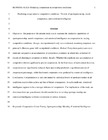Predicting cooperation in competitive conditions: The role of sportspersonship, moral competence, and emotional intelligence (Pre-published version)
Citation
Perry, J. L. & Clough, P. J. (2017). Predicting cooperation in competitive conditions: The role of sportspersonship, moral competence, and emotional intelligence. Psychology of Sport and Exercise, 31, 88-92. doi: 10.1016/j.psychsport.2017.04.008.

View/
Date
2017Author
Perry, John
Clough, Peter J.
Peer Reviewed
YesMetadata
Show full item record
Perry, J. L. & Clough, P. J. (2017). Predicting cooperation in competitive conditions: The role of sportspersonship, moral competence, and emotional intelligence. Psychology of Sport and Exercise, 31, 88-92. doi: 10.1016/j.psychsport.2017.04.008.
Abstract
Objectives: The purpose of the present study was to examine the predictive capabilities of sportspersonship, moral competence, and emotional intelligence on cooperation in varying competitive conditions.Design: An experimental study was conducted, examining responses in a prisoner's dilemma game with manipulated conditions.Method: Forty-three participants were randomly assigned to an accumulative or competitive condition, in which they contested 10 rounds of choosing to cooperate or defect.
Results: Whether the condition was accumulative or competitive did not significantly predict cooperation. In the final round of each contest however, cooperation was significantly reduced. Sportspersonship predicted a significant amount of cooperation percentage, while final round cooperation was predicted by emotional intelligence. Conclusions: Cooperation is in part determined by individual levels of sportspersonship in all conditions except when actions are free of future consequence. In such conditions, emotional intelligence appears to be a stronger indicator of cooperation. The implications of the study are that researchers and practitioners should consider how to develop sportspersonship and emotional intelligence to boost cooperation in various domains.
Keywords
CooperationGame theory
Sportspersonship
Morality
Emotional intelligence

